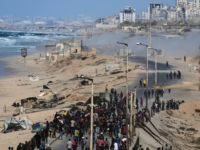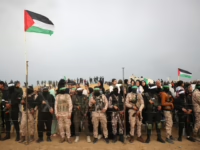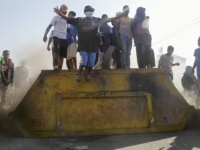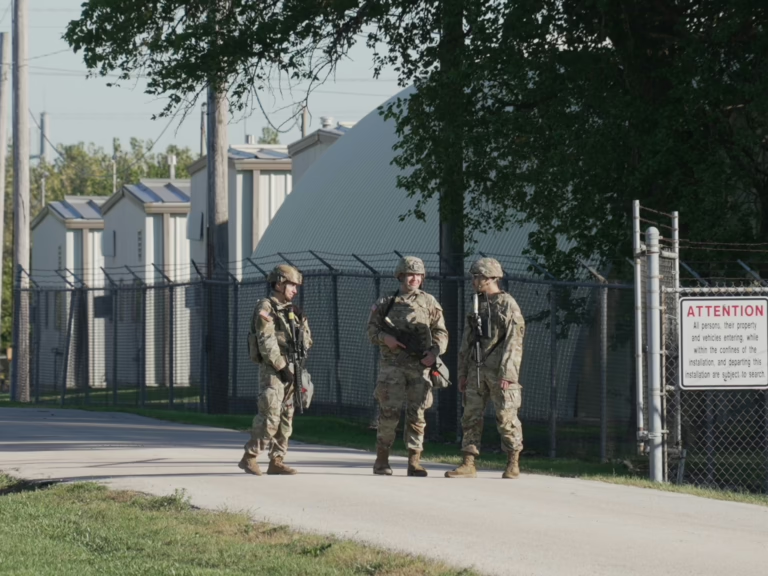National Guard units have been deployed to the Chicago region amid President Trump’s harsh criticism of the city as a ‘hellhole’.
The decision by President Donald Trump to send National Guard troops to Illinois is set to be examined in court during a crucial hearing.
On Thursday, US District Judge April Perry will consider a motion seeking to halt the deployment of Guard members from Illinois and Texas, following the initial arrival of a limited number of troops assigned to safeguard federal sites in the Chicago vicinity.
Recommended Stories
list of 3 itemsend of list
Governor JB Pritzker of Illinois, along with city officials, has voiced strong opposition to the Guard’s presence.
A contingent of approximately 200 Texas National Guard soldiers began operations in the Chicago area on Wednesday, according to a spokesperson from US Northern Command who spoke anonymously to The Associated Press to discuss sensitive operational information.
The exact locations of these troops have not been disclosed.
These Texas troops joined roughly 300 Illinois Guard members at a US Army Reserve Center located in Elwood, southwest of Chicago. All 500 personnel are under the command of Northern Command and have been activated for a 60-day period.
The Guard’s mission is to protect Immigration and Customs Enforcement (ICE) facilities, other federal buildings, and law enforcement officers, as stated by Northern Command.
On Monday, Chicago and the state of Illinois filed a lawsuit challenging the deployments, labeling them both unnecessary and unlawful.
President Trump has characterized Chicago as a crime-ridden “hellhole,” despite data indicating a notable decline in crime rates recently.
In their legal filing, the city and state argue that protests at a temporary ICE detention center in Broadview, a Chicago suburb, have “never impeded federal immigration enforcement.”
“The President is exploiting the Broadview demonstrations as a pretext,” the filing states. “This impending federal troop deployment in Illinois represents the latest chapter in the administration’s broader effort to target jurisdictions it disfavors.”
On Wednesday, Trump suggested that Chicago Mayor Brandon Johnson and Governor Pritzker, both Democrats, should face imprisonment for allegedly failing to safeguard federal agents during immigration enforcement actions.
Meanwhile, on Thursday, a panel from the 9th US Circuit Court of Appeals was scheduled to review whether Trump had the authority to assume control over 200 Oregon National Guard troops. The president intended to deploy these forces in Portland, where nightly protests-mostly small in scale-have occurred outside an ICE facility.
State and local leaders maintain that the presence of troops is neither desired nor necessary.
US District Judge Karin J. Immergut issued a temporary restraining order on Sunday, blocking the deployment of Guard troops to Portland. This order came after Trump mobilized California Guard members for Portland shortly after the initial block on Oregon’s Guard deployment.
The administration has not yet appealed this ruling to the 9th Circuit.
Judge Immergut, appointed by Trump during his first term, dismissed the president’s claims that troops were essential to protect Portland and immigration sites, noting that “there has been no sustained period of violent or disruptive protests in the city for months.”
The Posse Comitatus Act, nearly 150 years old, restricts the military’s involvement in domestic law enforcement.
Nonetheless, Trump has expressed willingness to invoke the Insurrection Act, which permits the president to deploy active-duty military forces in states unable to control insurrections or defying federal laws.
Previously, Trump dispatched troops to Los Angeles and Washington, D.C., and recently, a small group began assisting law enforcement in Memphis, Tennessee.
These forces are part of the Memphis Safe Task Force, a coalition of about a dozen federal law enforcement agencies directed by Trump to combat crime in the city.
Unlike other states, Tennessee’s Republican Governor Bill Lee supports the deployment of the National Guard.





















